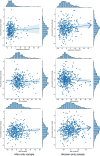Sex-specific blood biomarkers linked to memory changes in middle-aged adults: The Framingham Heart Study
- PMID: 38545543
- PMCID: PMC10966919
- DOI: 10.1002/dad2.12569
Sex-specific blood biomarkers linked to memory changes in middle-aged adults: The Framingham Heart Study
Abstract
The relationship between sex-specific blood biomarkers and memory changes in middle-aged adults remains unclear. We aimed to investigate this relationship using the data from the Framingham Heart Study (FHS). We conducted association analysis, partial correlation analysis, and causal dose-response curves using blood biomarkers and other data from 793 middle-aged participants (≤ 60 years) from the FHS Offspring Cohort. The results revealed associations of adiponectin and fasting blood glucose with midlife memory change, along with a U-shaped relationship of high-density lipoprotein cholesterol with memory change. No significant associations were found for the other blood biomarkers (e.g., amyloid beta protein 42) with memory change. To our knowledge, this is the first sex-specific network analysis of blood biomarkers related to midlife memory change in a prospective cohort study. Our findings highlight the importance of targeting cardiometabolic risks and the need to validate midlife-specific biomarkers that can accelerate the development of primary preventive strategies.
Keywords: association; blood biomarkers; memory decline; middle‐aged adults; sex difference.
© 2024 The Authors. Alzheimer's & Dementia: Diagnosis, Assessment & Disease Monitoring published by Wiley Periodicals LLC on behalf of Alzheimer's Association.
Conflict of interest statement
PMD has received research grants, advisory/board fees, and/or stock from several companies and is a co‐inventor on several patents related to the diagnosis and treatment of dementia. Other authors declare that they have no conflict of interests. Author disclosures are available in the supporting information.
Figures



Similar articles
-
Flavonoid-Rich Fruit Intake in Midlife and Late-Life and Associations with Risk of Dementia: The Framingham Heart Study.J Prev Alzheimers Dis. 2024;11(5):1270-1279. doi: 10.14283/jpad.2024.116. J Prev Alzheimers Dis. 2024. PMID: 39350372 Free PMC article.
-
Cardiovascular disease protein biomarkers are associated with kidney function: The Framingham Heart Study.PLoS One. 2022 May 11;17(5):e0268293. doi: 10.1371/journal.pone.0268293. eCollection 2022. PLoS One. 2022. PMID: 35544531 Free PMC article.
-
Association of Estradiol and Visceral Fat With Structural Brain Networks and Memory Performance in Adults.JAMA Netw Open. 2019 Jun 5;2(6):e196126. doi: 10.1001/jamanetworkopen.2019.6126. JAMA Netw Open. 2019. PMID: 31225892 Free PMC article.
-
Age- and sex-specific effects of a long-term lifestyle intervention on body weight and cardiometabolic health markers in adults with prediabetes: results from the diabetes prevention study PREVIEW.Diabetologia. 2022 Aug;65(8):1262-1277. doi: 10.1007/s00125-022-05716-3. Epub 2022 May 25. Diabetologia. 2022. PMID: 35610522 Free PMC article.
-
Does four-week consecutive, dawn-to-sunset intermittent fasting during Ramadan affect cardiometabolic risk factors in healthy adults? A systematic review, meta-analysis, and meta-regression.Nutr Metab Cardiovasc Dis. 2021 Jul 22;31(8):2273-2301. doi: 10.1016/j.numecd.2021.05.002. Epub 2021 May 25. Nutr Metab Cardiovasc Dis. 2021. PMID: 34167865
Cited by
-
Identifying Proteomic Prognostic Markers for Alzheimer's Disease with Survival Machine Learning: the Framingham Heart Study.medRxiv [Preprint]. 2024 Sep 23:2024.09.21.24314123. doi: 10.1101/2024.09.21.24314123. medRxiv. 2024. Update in: J Prev Alzheimers Dis. 2025 Feb;12(2):100021. doi: 10.1016/j.tjpad.2024.100021. PMID: 39399041 Free PMC article. Updated. Preprint.
-
Identifying proteomic prognostic markers for Alzheimer's disease with survival machine learning: The Framingham Heart Study.J Prev Alzheimers Dis. 2025 Feb;12(2):100021. doi: 10.1016/j.tjpad.2024.100021. Epub 2025 Jan 1. J Prev Alzheimers Dis. 2025. PMID: 39863332 Free PMC article.
References
Grants and funding
LinkOut - more resources
Full Text Sources
